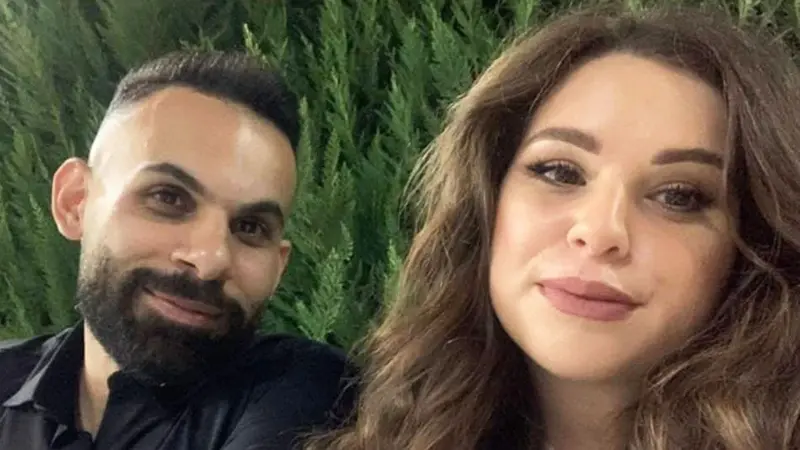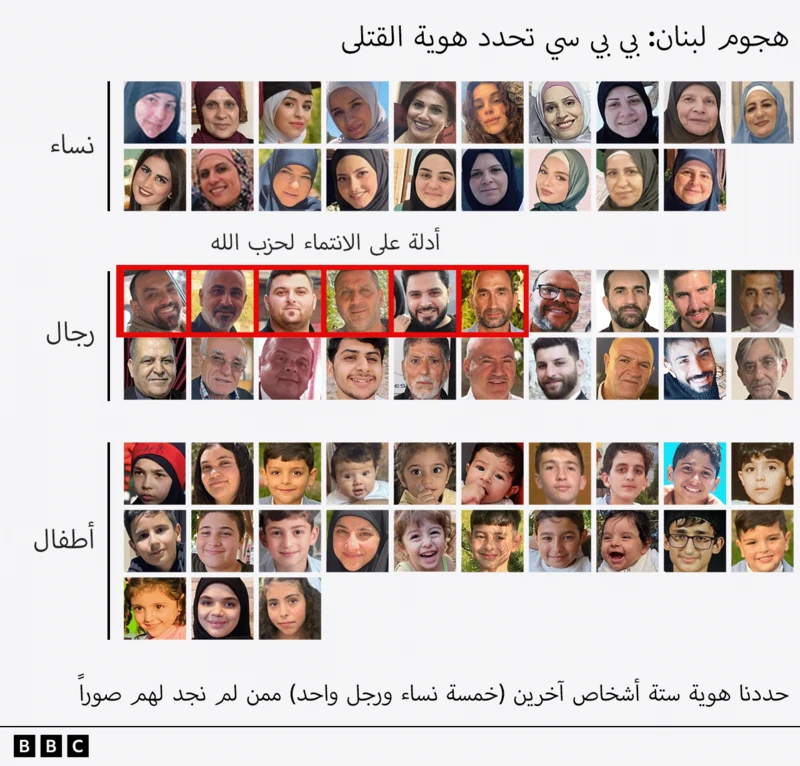This is a Google translated article from the BBC.
Al-Maqhafi
BBC International Investigations Correspondent
Julia Ramadan was terrified as the war between Israel and Hezbollah escalated, and she had a nightmare that her family home was being bombed. When she sent her brother Ashraf a voice message from her apartment in Beirut, encouraging her to join him in Ain el-Delb, a quiet village in southern Lebanon…
“It’s safe here,” he reassured her. “Come and stay with us until things calm down.”
Earlier that month, Israel intensified its air campaign against Hezbollah in Lebanon, in response to escalating rocket attacks by the Iran-backed group that have killed civilians and displaced tens of thousands from their homes in northern Israel.

Ashraf was confident that his family’s apartment building would be a safe haven, so Julia joined him. But the next day, on September 29, the building was hit by the deadliest Israeli attack of the conflict, when Israeli missiles struck it and the six-story building collapsed, killing 73 people. The Israeli military says the building was targeted because it was a “terrorist command center” for Hezbollah, and that it “eliminated” a Hezbollah leader, adding that the “overwhelming majority” of those killed in the strike were “terrorist operatives.”
But an investigation by the BBC Fact Check team has confirmed the identities of 68 of the 73 people killed in the attack, and has uncovered evidence that only six were linked to Hezbollah’s military wing, and none of those six held senior military ranks. The BBC has also found that the other 62 were civilians, 23 of them children.
Among those killed were children who were only a few months old, such as Noah Kobeissi in apartment 2B; in apartment 1C, teacher Abir Hallaq was killed alongside her husband and three of her sons; and on the third floor, Amal Hakawati died alongside three generations of her family: her husband, sons and two granddaughters.

Ashraf and Julia have always been close, sharing everything with each other. Ashraf describes his sister as “like a black box, holding all his secrets.”
On the afternoon of September 29, the siblings returned home after helping to distribute food to families fleeing the fighting, as hundreds of thousands of people in Lebanon have been displaced by the war.
Ashraf was taking a shower, Julia was sitting in the living room with their father, helping him upload a video to social media, and their mother, Janan, was cleaning the kitchen.
Then, without warning, they heard a deafening boom, the entire building shook, and a huge cloud of dust and smoke poured into their apartment.
“I shouted, ‘Julia! Julia!’ and she replied, ‘I’m here,’” Ashraf says.
“I looked at my father, who was struggling to get up from the couch because of a leg injury, and I saw my mother running towards the front door.”
Julia’s nightmare was coming true.
“Julia was breathing heavily, crying on the sofa,” he says. “I was trying to calm her down and telling her we needed to get out, and then another attack happened.”
A video of the strike, circulating online and verified by the BBC, shows four Israeli missiles heading towards the building, and seconds later the building collapses.
Ashraf, along with many others, was trapped under the rubble. He started calling out, but the only voice he could hear was his father’s, telling him that he could still hear Julia and that she was alive. Neither of them could hear Ashraf’s mother.

Ashraf sent a voice message to friends in the neighborhood to alert them, and the next few hours were agonizing, as he heard rescuers clearing the rubble and the wailing of residents who discovered their loved ones dead. “I was praying, ‘Please God, not Julia, I can’t live this life without Julia,’” Ashraf says.
Ashraf was finally pulled from the rubble hours later, with only minor injuries.
He discovered that his mother had been rescued but died in hospital, while Julia had suffocated under the rubble. His father later told him that Julia’s last words were pleas for her brother.
In November, a ceasefire was agreed between Israel and Hezbollah to end the conflict, giving Israel 60 days to withdraw from southern Lebanon and Hezbollah to withdraw its forces and weapons north of the Litani River.
As the 60-day deadline approached on 26 January, the BBC fact-finding team sought to find out more about the most violent Israeli assault on Lebanon in years.
In the flat below Julia and Ashraf’s house, Hawra and Ali Fares were hosting family members displaced by the war, including Hawra’s sister Batoul, who – like Julia – had arrived the previous day with her husband and two young children, having fled heavy shelling near the Lebanese-Israeli border in areas where Hezbollah has a strong presence.
Batoul’s husband, Mohammad Faris, was killed in the Ain al-Dalb attack, and a column fell on Batoul and her two daughters. She says that no one responded to her calls for help, and she was finally able to lift the column on her own, but her four-year-old daughter, Hawra, was crushed to death under the column. Miraculously, her other daughter, Malak, survived.
On the third floor, under Batoul’s house, lived Denise and Mohieddin al-Baba.
That Sunday, Denise invited her brother Hisham for lunch. “The impact of the strike was brutal,” Hisham says.
“The second missile knocked me to the ground, and the whole wall collapsed on top of me,” he adds. He spent seven hours under the rubble.
“I heard a distant sound, people talking, screaming, and someone saying, ‘Cover her, get her out, lift the stones, he’s still alive, he’s a child, lift this child,’” Hisham says.
“I mean, oh God, I thought to myself, I’m the last person under the ground, no one will know I’m here, I’m going to die here,” Hisham continues.
When Hisham was finally rescued, he found his niece’s fiancé waiting to hear if she was alive. He initially lied to him and told him she was fine, but her body was found three days later.
Hisham lost four family members, his sister, his brother-in-law, and their two children, and he told us he lost his faith after all of this.
Israel and Hezbollah say they don’t want war but are ready for it
To learn more about the dead, we analyzed Lebanese Health Ministry statements, videos, and social media posts, as well as speaking to survivors of the attack.
In particular, we wanted to verify the Israeli military’s response to the media — immediately after the attack — that the apartment building was a Hezbollah command center. We asked the Israeli military several times what the command center was, but it did not provide an explanation.
We began by checking social media condolences, grave sites, public health records, and funeral videos to determine whether any of those killed in the attack had any military affiliation with Hezbollah.
We were able to find evidence that only six of the 68 identified dead were linked to Hezbollah’s military wing.
Hezbollah used the term “mujahid” for the photos it released of the six men; by contrast, the group typically refers to senior figures as “commander,” a designation the group did not use to describe those killed in that attack. We asked the Israeli military whether the six Hezbollah fighters we identified were the intended targets of the strike, but it did not respond to that question.
One of the Hezbollah fighters we identified was Mohammed Fares, Batoul’s husband, who told us that he, like many other men in southern Lebanon, was a Hezbollah reservist, though she added that he was never paid by Hezbollah, held no official rank, and did not take part in combat.
Israel views Hezbollah as one of its main threats. It has been designated a terrorist organization by Israel, many Western governments, and Gulf states.
But in addition to its large and well-armed military wing, Hezbollah is also an influential political party, holding seats in the Lebanese parliament, and in many parts of the country, Hezbollah has become part of the social fabric, providing a network of social services.
In response to our inquiry, the Israeli military said that “its strikes on military targets are subject to the relevant provisions of international law, including taking feasible precautions, and are carried out after assessing the expected collateral damage, and that the civilian casualties will not be excessive compared to the expected military success of the strike.”
The Israeli military previously told the BBC that it had carried out “evacuation procedures” before the strike on Ain al-Dalb, but everyone we spoke to said they had received no warning.
UN experts have expressed concern about Israeli air strikes on residential buildings in densely populated areas of Lebanon.
This pattern of targeting entire buildings – resulting in heavy civilian casualties – has been a recurring feature of the latest conflict between Israel and Hezbollah, which began when the group stepped up its rocket attacks in response to Israel’s war in Gaza.
Between October 2023 and November 2024, Lebanese authorities say more than 3,960 people were killed in Lebanon by Israeli forces, many of them civilians.
Over the same period, Israeli authorities say at least 47 civilians were killed by Hezbollah rockets fired from southern Lebanon, and at least 80 Israeli soldiers were killed in fighting in southern Lebanon or as a result of rocket attacks on northern Israel.
The attack on Ain al-Delb is the deadliest Israeli attack on a building in Lebanon in at least 18 years.
The scars of the bombing remain in the village. When we visited more than a month after the bombing, a father was coming to the site daily, hoping for news of his 11-year-old son, whose body has yet to be found.
Ashraf Ramadan also returns to the site, searching through the rubble for what remains of the memories his family has built over the two decades they have lived there.
Ashraf shows me the door to his closet, still decorated with pictures of his favorite footballers and pop stars, and pulls a teddy bear from the rubble, telling me it has always been on his bed.
“Nothing I find here will make up for the people we have lost,” he says.